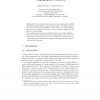Free Online Productivity Tools
i2Speak
i2Symbol
i2OCR
iTex2Img
iWeb2Print
iWeb2Shot
i2Type
iPdf2Split
iPdf2Merge
i2Bopomofo
i2Arabic
i2Style
i2Image
i2PDF
iLatex2Rtf
Sci2ools
110
click to vote
CRYPTO
2000
Springer
2000
Springer
On the Round Security of Symmetric-Key Cryptographic Primitives
We put forward a new model for understanding the security of symmetric-key primitives, such as block ciphers. The model captures the fact that many such primitives often consist of iterating simpler constructs for a number of rounds, and may provide insight into the security of such designs. We completely characterize the security of four-round Luby-Rackoff ciphers in our model, and show that the ciphers remain secure even if the adversary is given black-box access to the middle two round functions. A similar result can be obtained for message authentication codes based on universal hash functions.
Block Ciphers | CRYPTO 2000 | Cryptology | Four-round Luby-rackoff Ciphers | Symmetric-key Primitives |
Related Content
| Added | 02 Aug 2010 |
| Updated | 02 Aug 2010 |
| Type | Conference |
| Year | 2000 |
| Where | CRYPTO |
| Authors | Zulfikar Ramzan, Leonid Reyzin |
Comments (0)

